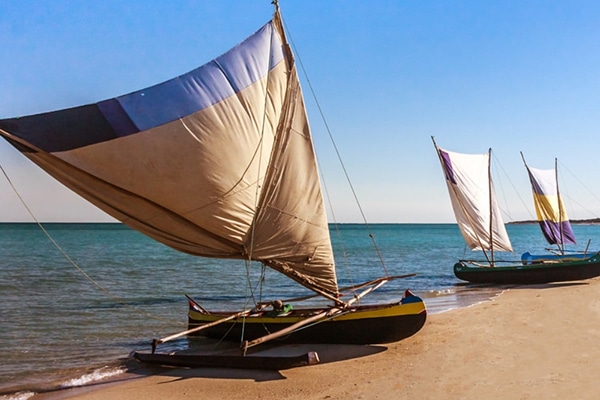Malagasy tradition blends harmoniously with the rich cultural fabric of the Vezo, a distinct subgroup of the Sakalava ethnic group, which represents one of the 18 diverse ethnic groups present in Madagascar. These semi-nomadic coastal fishermen reside mainly along the beaches in the southwest of Madagascar, notably in the village of Anakao, within a territory that extends over more than 300 kilometers of coastline. The Vezo community, anchored in Malagasy tradition, numbers around 60,000 individuals and its origins, although subject to much speculation, are generally attributed to Indonesia.
Fishing, at the heart of Malagasy tradition, is also at the heart of Vezo life. The main tool of these fishermen is the famous outrigger canoe, considered essential to their existence. Carved from tree trunks, these traditional canoes are equipped with a square sail rigged on two V-shaped masts and a single outrigger. The Vezo, respectful of their Malagasy traditions, make these canoes themselves using ancient techniques passed down by their ancestors.
The quasi-mystical relationship Vezo fishermen with the sea fits harmoniously into Malagasy tradition. They consider the sea a holy place, believing in a great, anonymous god who governs the sea, as well as in spirits who inhabit and watch over it carefully.
Deeply rooted in Malagasy tradition, the Vezo respect many fady (prohibitions). They continue to practice ancestral methods of fishing with harpoons and nets, attributing particular prestige to turtle fishing, governed by strict rules for sharing the prey. Mortuary rites, another important component of Malagasy tradition, are also scrupulously observed, with the need for a Vezo to be buried at the place of his birth to maintain the link with his ancestors.
Vezo women also perpetuate aesthetic traditions by making beauty masks based on natural powder, designed to cleanse the skin and protect it from the sun. Some of them add designs and flowers to the masks, expressing an intimate connection with their natural environment. Thus, the Malagasy tradition weaves a rich and vibrant fabric within the Vezo culture, offering a fascinating insight into the cultural diversity of Madagascar.






Comment (0)